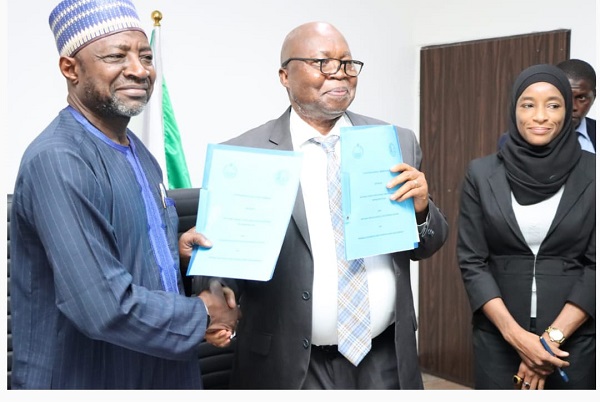
The National Agency for Science and Engineering Infrastructure (NASENI) has signed a memorandum of understanding (MoU) with the National Metallurgical Development Centre (NMDC) Jos, to work together to revamp the iron and the steel sector of the country and other allied industries.
Speaking during the signing of the document today (January 17, 2023) in Abuja, the executive vice chairman, NASENI, Prof. Mohammed Haruna remarked that no meaningful industrialisation will yield fruits without the development of Nigeria’s iron and steel sector.
Haruna said to run Nigeria’s industries effectively and sustain the manufacturing sector locally.
“Nigeria needs to build most of its machines and equipment locally to deepen the impacts of innovations and make the manufacturing of goods and services become a part and parcel of the culture of the citizens.
Haruna explained that for industrialisation to become sustainable in any country, the steel, iron and tools required to build the machines needed to sustain both the productive and manufacturing capacities of the country, to a large extent, must be developed locally.
The NMDC Jos was established as a research and development organisation with the mandate to carry out research and development activities for the metallurgical and allied industries for the growth of the nation’s solid minerals sector, while NASENI has the mandate of providing research and developmental works in the areas of capital goods, machines and equipment for the purpose of developing a home-grown and home-sustained industrial development of the country.
“Without the full participation of NMDC and the metallurgical development subsector of the economy, it is extremely difficult to industrialise Nigeria,” he said.
Speaking further, the executive vice chairman disclosed that the newly signed MoU between NASENI and NMDC would provide a threshold for the resuscitation of Nigeria’s iron and steel sector and the beginning of the genuine revitalisation of its industrial sector.
“The NMDC is the real development centre to make our nation economically viable and the MoU between the centre and NASENI today is to put the sustainable development of the manufacturing industry on the right track.”
He said the reasons why many Nigerian industries are not viable is because the support for making the local iron, steel and tools, machines and equipment are not home-grown nor home-sustained innovations available.
“We keep importing everything into Nigeria and no nation can develop that way.”
Haruna assured that the working collaborations at the instance of the MoU between NASENI and NMDC was instituted to provide a solid foundation for the steel and iron sector of Nigeria to flourish because the subsector is the foundation for the prosperity of the nation’s manufacturing sector.
Responding during the signing of the MoU, the director-general of NMDC, Prof. Linus Asuquo who signed the document on behalf of the centre thanked Haruna and the NASENI management for the leadership in promoting the science, technology and innovation sector of the Nigerian economy.
He referred to the EVC NASENI as an “uncommon reformer” and commended the various technology strides attained so far by the agency under the leadership of Prof. Haruna `
A statement by NASENI’s deputy director, information, Mr. Olusegun Ayeoyenikan, said the MoU included terms of reference related to equipment and facilities support in the areas of metallurgy research and development, minerals research and development, analytical and environmental services, consultancy services in metallurgy, mineral processing, analytical and environmental-related issues, capacity-building equipment and machine design, fabrication, spares and component parts production, equipment and machinery maintenance, repairs and training, supply of research equipment and shared facilities, joint research and development and commercial ventures, as well as other areas which may be determined by both parties.


